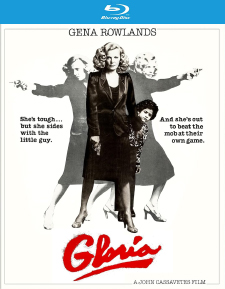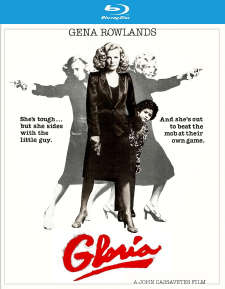Gloria (1980) (Blu-ray Review)

Director
John CassavetesRelease Date(s)
1980 (July 18, 2023)Studio(s)
Columbia Pictures (Kino Lorber Studio Classics)- Film/Program Grade: A-
- Video Grade: A
- Audio Grade: A
- Extras Grade: D+
Review
Actor-turned-filmmaker John Cassavetes virtually defined American independent cinema of the 1970s. Though he began in 1959 with Faces, it was after his success as an actor in The Dirty Dozen (1967) and Rosemary’s Baby the following year that financed the complete freedom for Cassavetes to make his unique mark in films including Husbands (1970), A Woman Under the Influence (1974), and Opening Night (1977), many starring his actress-wife, Gena Rowlands, and friends like Peter Falk, Seymour Cassel, and Ben Gazzara. His films are noted for their actorly emphasis and raw character relationships that are edgier than just about anything coming out of Hollywood. Back in the ‘70s, a good friend of mine went to see A Woman Under the Influence with her sister; so authentic was Rowlands’s performance as a severely mentally ill woman they experienced flashbacks to their own mentally ill mother and the sister suffered a breakdown right there in the theater.
Gloria (1980) was as close as Cassavetes ever got to directing a mainstream, commercial studio crime thriller, though it’s much more emphatically Cassavetes than Dirty Harry. Once again, its main asset is Gena Rowlands, whose work here is truly transcendental.
Jack Dawn (Buck Henry) is a bookkeeper for the mob with a contract out on him and his family after turning informant for the FBI. In his crummy apartment in the South Bronx (within spitting distance of Yankee Stadium), he implores his Puerto Rican wife, Jeri (Julie Carmen), and their kids to grab their things and go. A neighbor, Gloria Swenson (Rowlands), casually stopping by, walks into this tense situation, and when Jack’s teenage daughter locks herself in the bathroom, refusing to leave, Jack fobs six-year-old son Phil (Juan Adames) along with an incriminating account ledger off on Gloria, practically pushing the two of them down the hall and back toward Gloria’s apartment.
Moments later a couple of torpedoes (one is played by Tom Noonan) storm the apartment and blow the family to pieces with shotguns. Gloria, former girlfriend of gangster Tanzinni, realizes the Mafia will be gunning for her and the boy next, and hides out at a friend’s empty apartment in Manhattan. There, Phil wants to go back home, while on TV Gloria is named as a suspect in Phil’s “kidnapping.”
Cassavetes wrote the original script purely for the money, with no intention of directing it. Apparently, it was written with Barbra Streisand in mind, and when she turned it down, Rowlands was approached, and then she in turn requested her husband. In any case, while the basic premise draws on tired gangster genre clichés that would have been right at home on Johnny Staccato, Cassavetes’s old TV series, Rowlands’s portrayal of the hardened former gun moll is revelatory. Even compared to the toughest dames of classic film noir, Barbara Stanwyck in Double Indemnity, for instance, Rowlands take this character type one step further than ever seen before.
And the timing was perfect. In her late 40s, Rowlands, extraordinarily beautiful in her youth, was now middle-aged: interestingly and probably accidentally, Rowlands is still quite lovely in some shots while in others she looks almost grandmotherly. She’s plausible as a kind of used-up former girlfriend of a gangster, the type character actors like Jean Willes and Barbara Nichols used to play, cheap but tough, but with subtle hints of vulnerability beneath a seemingly impregnable veneer.
Alone among such character types, Rowlands is tough in ways that are uniquely believable; one never sees the acting. She completely inhabits this character. When director Sidney Lumet unwisely remade Gloria a dozen or so years later, Sharon Stone, a decent actress, played the title role. There you ALWAYS saw the actor beneath the gaudy makeup and tacky clothing and Bronx accent. Rowlands, never.
It’s easy to guess the scene that must have sold the project to Columbia Pictures. Gloria and Phil are walking down the street when a car with four gangsters rolls up. Their leader gives the usual spiel about “We’re not interested in you, Gloria. All we want is the kid,” etc., etc. Gloria, cornered, looks ready to drop to her knees and beg when instead she whips out a handgun and fires multiple rounds into the car, hitting several of the hoods inside. The car peels away, and Gloria keeps shooting—BANG! BANG! BANG! Pam Grier played such characters in ‘70s Blaxploitation films with great élan, but Rowlands, a much better actress, makes it credible.
On the downside—and there’s a BIG downside—is that the child actor playing Phil is as terrible as Rowlands is excellent. He’s physically awkward and seems incapable of delivering lines naturally. The fault is not entirely his, as Cassavetes’s screenplay gives him equally unnatural dialogue, seemingly with the goal of making Phil talk tougher than his years, a kind of proto-Dead End Kid that’s like a miniature Leo Gorcey. Gloria is definitely a film of extremes: whenever the focus is on Rowlands’s character it comes alive and then some; when it attempts moments of intimacy between Gloria and Phil, the film feels amateurish. Why didn’t Cassavetes, famous for allowing much improvisation among his actors, apply this method here?
Cassavetes also erred in some of his casting. When we finally meet Tanzinni, the non-actor playing him, Basilino Franchina, an Italian screenwriter and assistant director, just isn’t up to the task. The character should be charismatic, larger than life, but Franchina is just an old man.
Gloria does a fine job capturing pre-gentrified New York, however. It’s one of those ‘70s films—The Taking of Pelham One Two Three (1974) is another—that really captures the city at its most unseemly and inhospitable.
Kino’s all-Region Blu-ray of Gloria looks flawless. Presented in 1.85:1 widescreen, the film looks brand-new. The packaging makes no mention of a new 4K remaster but it sure looks like one. Detail, colors, contrast, etc. are all exceptional. The DTS-HD Master Audio (2.0 mono) is also excellent for what it is, and optional English subtitles are provided.
The lone extra is what’s billed on the packaging as “Two Theatrical Trailers.” Actually, they’re the same trailer, one with narration, one without. However, there’s also a genuinely bizarre trailer included for the Sidney Lumet remake, a trailer that sells the picture as a goofy comedy about a wisecracking kid and a dame.
For Gena Rowlands alone, Gloria is well worth seeing and Highly Recommended.
- Stuart Galbraith IV

